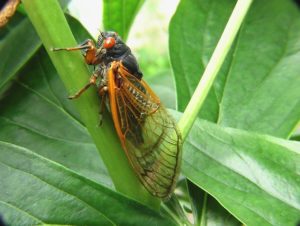
The cicadas are coming! Pet owners can be prepared with these tips.
The cicada craze is coming back this spring in 2021! Every 17 years, the cicada invasion rises and falls. Marylanders will remember the sights of red or blue-eyed insects everywhere: on the sidewalks, on the bushes, and in the air. They will be everywhere. Pet owners may wonder whether this 17-year phenomenon holds any danger for their cat or dog. Below is a deeper look into this issue.
What Are Periodical Cicadas?
Periodical cicadas make up 15 different broods with staggering life cycles around the eastern United States, especially in Maryland, Delaware, Pennsylvania, Ohio, and Indiana. For 13-17 years, their larvae burrow underground and feed on local tree roots. When this long, dark period is up, they become cicadas and gather above ground in the billions or trillions. In the ensuing five-to-six weeks, they spend their brief adult lives hurrying to mate and lay their eggs and feed on the sap of the very trees they ate as larvae. Throughout the land, their mating calls sound at up to 100 decibels. Once they have laid and fertilized their eggs in the ground, they die at once.
The Benefits of Cicadas
Cicadas might make it a challenge to get to your car without running into a few of them, but these insects are actually very beneficial to the land and not as harmful as one might think. Unlike locusts, they do not eat plants, but only the sap from trees. They are non-toxic and even make the menu on some local barbecues. Their shed skins make for great plant food, and their burrows help aerate the ground. They might seem like a nuisance but are actually quite healthful for the environment.
Are They Dangerous to Pets?
In 2004, a viral Facebook story about a dog dying after ingesting 300 cicadas sent pet owners into a flurry of concern for their own pets. The truth is, because cicadas are not poisonous, they are not an immediate threat to your dog or cat should they ingest one. Because of the cicadas’ crunchy shells, however, eating many could cause significant discomfort. Pet owners should prevent their pets from gorging on these 17-year creatures. If your pet shows signs of illness, call your vet.
Trust the Care of Your Pet to the Professionals at Everhart Veterinary Medicine!
At Everhart Veterinary Medicine, our veterinary professionals strive to provide your pet with the very best of veterinary care. We believe that the best care for your pet should be provided by experienced, compassionate, and knowledgeable veterinary professionals. With two Maryland locations in both Baltimore and Pasadena, we are always ready to welcome your pet as a new patient! Give us a call today at 410-355-3131 or 410-793-7670! For more information, as well as updates on veterinary news and topics, visit us on Facebook, Twitter, or LinkedIn!
